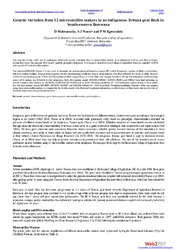Genetic variation from 12 microsatellite makers in an indigenous Tswana goat flock in South-eastern Botswana
Date
2013Author
Maletsanake, D.
Nsoso, Shalaulani James
Kgwatalala, Patrick
Metadata
Show full item recordAbstract
The objective of this study was to preliminary characterize genetic variability from 12 microsatellite markers in an indigenous Tswana goat flock in South-eastern Botswana. The genomic DNA from 87 partially pedigreed indigenous Tswana goats from Botswana College of Agriculture farm was amplified via PCR with a panel of 12 microsatellite markers.
The program POPGENE Version 1.31 was used to determine the polymorphism information content (PIC), allele frequencies, number of alleles at each locus, effective number of alleles, average heterozygosity (H) and the inbreeding coefficient (FIS) in the population. The flock exhibited low levels of allelic diversity (1.83±0.83) and heterozygosity (0.16±0.20). The number of alleles ranged from 1 to 3 with allele sizes ranging from 99 to 260 bp. The inbreeding coefficient (FIS) across all 12 markers was 0.12±0.16 for this indigenous flock. Five markers namely BM1329, CSRD247, ILST002, RM004 and INRA63 were fixed indicating no genetic variation, three markers i.e. SRCRSP8, OARFCB20 and MAF65 were in Hardy-Weinberg equilibrium (P > 0.05) indicating random mating at those marker loci and four markers namely SRCRSP5, MCM527, ILST087 and INRA006 differed (P < 0.05) from Hardy-Weinberg equilibrium. Further studies are required using more microsatellite markers to compare this flock with country-wide flock and to generate information on effectiveness of directional selection for traits of economic importance and general productivity.
Collections
- Research articles [174]

